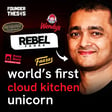
KukuFM's Secret Sauce: Exclusivity, Efficiency, and 'Asli Dhanda'
"Raising more money often means you made more mistakes."
This counter-intuitive take from Vinod Kumar Meena challenges the common startup narrative where fundraising equals success. He argues that true success lies in capital efficiency and building a sustainable business, not just chasing the next round.
Vinod Kumar Meena is the Co-Founder & COO of KukuFM, India's leading audio content platform. An IIT Jodhpur graduate and Forbes 30 Under 30 Asia honoree, he has scaled Kuku FM to over 6 million paying subscribers, targeting over ₹1000 Crore ($150M) in ARR, demonstrating phenomenal growth in the vernacular content space after raising over $70M.
Key Insights from the Conversation:
👉Why Silicon Valley startup advice can be detrimental in the Indian context.
👉The critical role of content exclusivity and understanding 'Bharat' for monetization.
👉Mastering digital distribution, influencer marketing, and why 'ads are content'.
👉The 'science' behind engaging mobile-first content (fast-paced, escapism).
👉Why gut calls often trump logical debates in decision-making.
👉Building a 'default alive' business vs. a VC-dependent startup.
👉AI's role as an enabler in content, not (yet) a replacement for creators.
Chapters:
(0:00:00) - Intro: Vinod's Journey from Village to IIT & Entrepreneurship
(0:07:30) - Early Startups, EdTech & Selling to Toppr
(0:18:08) - Why Vinod Left EdTech & The Power of Travel
(0:23:23) - Genesis of Kuku FM: Identifying the Vernacular Audio Gap
(0:29:45) - Building Content Supply & Cracking Monetization for India
(0:46:40) - Deep Dive: Monetization Strategy & Exclusivity
(0:51:30) - Unique Distribution Tactics: Influencers & Content-as-Ads
(01:06:30) - Mobile-First Content Science: What Engages 'Bharat'?
(01:17:50) - Challenging Startup Norms: Fundraising, Gut Calls & Silicon Valley Myths
(01:49:25) - AI in Content: Hype vs. Reality & Future Outlook
(01:55:35) - Final Advice: Build a BUSINESS, Not Just a Startup
#FounderThesis #StartupIndia #IndianStartups #ContentBusiness #VernacularContent #AudioPlatform #Podcast #Entrepreneurship #StartupAdvice #Monetization #DigitalMarketing #InfluencerMarketing #BuildingForBharat #MakeInIndia #MediaTech #ContentStrategy #Fundraising #VentureCapital #BootstrappingMindset #Leadership #businessstrategy
Disclaimer: The views expressed are those of the speaker, not necessarily the channel.



















